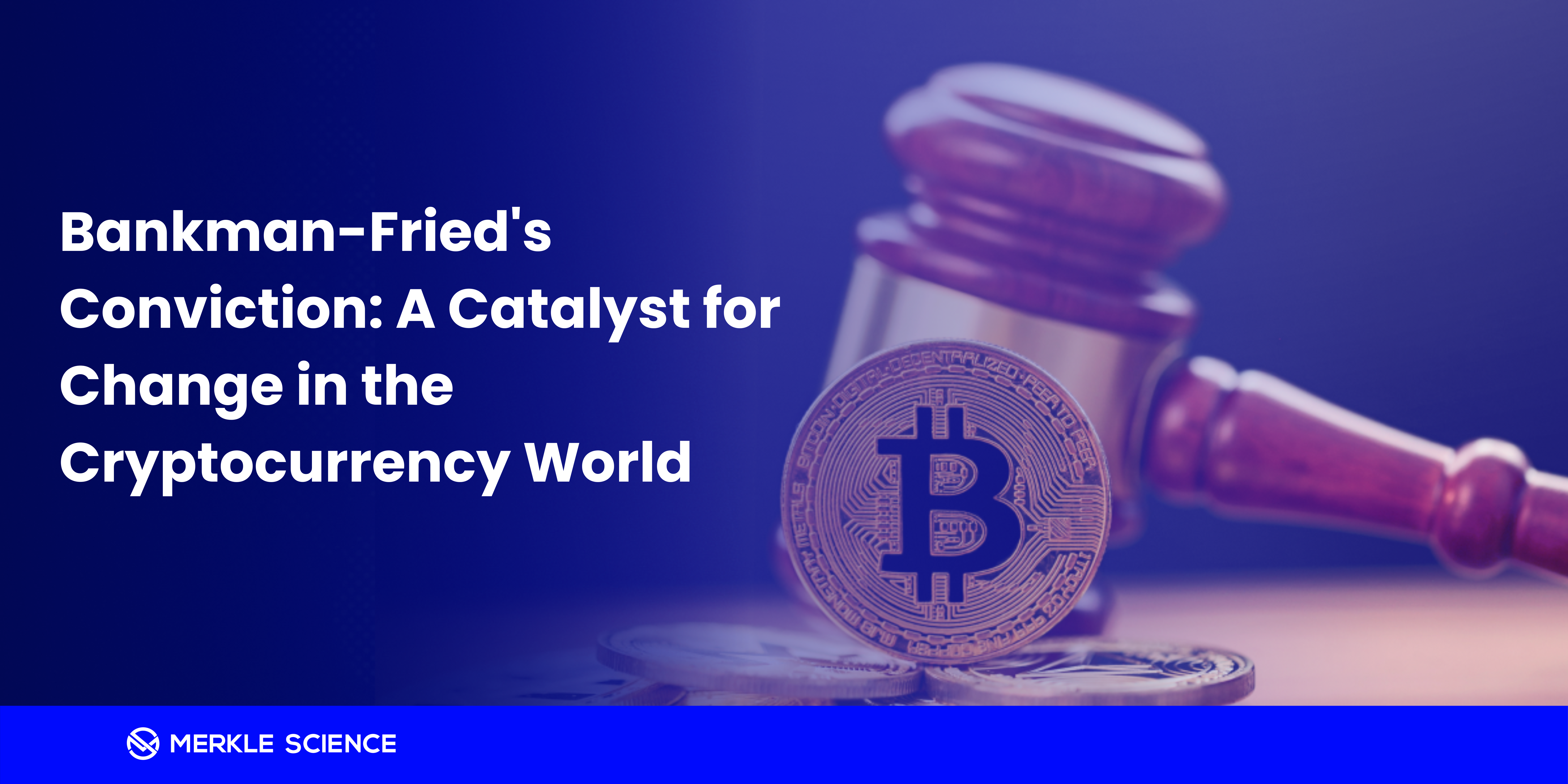Bankman-Fried's Conviction: A Catalyst for Change in the Cryptocurrency World

Merkle Science

When FTX founder Sam Bankman-Fried was found guilty on all seven charges on November 2, 2023, the general sentiment in the cryptocurrency community was one of relief. Former FTX users who lost funds in the exchange’s implosion are satisfied that the alleged mastermind behind the schemes will likely spend the rest of his life behind bars. Business leaders of legitimate exchanges are pleased to see justice prevail against a man who disgraced their industry.
Bankman-Fried will be sentenced in March 2024, facing up to 115 years for his guilt in the two counts of fraud and five for conspiracy. This sentencing will close the chapter on what has been a blemish on the world of cryptocurrency, but the story will not end there. Bankman-Fried’s actions will cast a ripple effect on the cryptocurrency space long after he is locked behind bars. An analog would be the Enron scandal. Convicting the fraudsters at Enron was only the first step - the next step was tightening the regulatory gaps that made accounting fraud on that scale possible in the first place. The same will happen in a post-Bankman-Fried world: There will be more safeguards to prevent the financial shenanigans that occurred at FTX, such as the self-dealing between FTX and its sister company, Alameda Research.
Here are three key ways that Bankman-Fried conviction and sentencing will have on the rest of the cryptocurrency world.
Regulatory momentum - The original version of the Responsible Financial Innovation Act (RFIA), or the Lummis-Gillibrand bill, failed to pass in Congress. Now on its second tour of Congress, the bill should find greater momentum across both sides of the aisle (Senator Cynthia Lummis is a Republican and Senator Kirsten Gillibrand is a Democrat), especially because FTX was one of the catalysts for the bill in the first place.
“The type of rehypothecation that was going on with FTX and some of the other attributes of FTX which caused it to fail would have been prevented had the Lummis-Gillibrand bill been in effect,” said Senator Lummis in an interview with CoinDesk.
If both Lummis and Gillibrand continue to drum up support for the RFIA by using Bankman-Fried’s conviction as a key premise, the two senators could find broader and quicker regulatory support for passing the bill. The same applies to other jurisdictions that proposed new policies in the aftermath of FTX’s collapse.
Sentencing as a deterrent - Bankman-Fried faces the astounding possible sentence of 115 years in prison. While most analysts do not believe he will serve this full sentence, the general consensus is that he will receive a stiff punishment. Other business leaders who commit similar crimes to Bankman-Fried will likely see similar draconian punishments.
The reason behind the lack of leniency is simple: Authorities need to make an example out of these fraudsters, as a deterrent against other would-be business leaders who may be thinking up similar schemes. By levying the stiffest punishment against fraudsters and scammers in cryptocurrency, other leaders will think twice about engaging in similar behavior.
Greater scrutiny on specific issues - The conviction of Bankman-Fried will create a blanket effect over exchanges and similar businesses in cryptocurrency. People, in short, will watch over everything that they do, scrutinizing them for any sign of wrongdoing.
Because of Bankman-Fried’s transgressions, there will be a particular focus on certain types of fraud and bad behavior. These include self-dealing (FTX lent funds to sister company Alamada Research, and several executives treated both like their own personal piggy bank), rehypothecation (Bankman-Fried famously claimed that he did not know that customer funds did not in fact belong to the organization), and a lack of corporate governance (when one investor advised FTX to form a board, one staff replied, “Fuck off.”)
These specific issues will remain hot-button topics in crypto media, policy-making, and with the public at large, who never wants to see a collapse on the scale of FTX ever again.
What’s next for Bankman-Fried
Statements from his lawyer, Mark Cohen, seem to hint at a possible appeal. Bankman-Fried also faces a second trial composed of charges that were excluded to facilitate his extradition from the Bahamas. While this legal battle may drag on, its impact on the world of cryptocurrency is already undeniable: People will remember this conviction as a watershed moment, one which allows the cryptocurrency space to shed its Wild West roots and professionalize into a mature, financial industry.
This bullish outlook cannot be overstated enough. Several analysts have pointed out that Bankman-Fried’s cryptocurrency was not integral to his scheme. Had he been in another business sector, he could have committed the same crimes with fiat, gold bars, artworks, or practically any medium of value in between. He is a fraudster, plain and simple. Eliminating these characters from the cryptocurrency sector through political will, severe punishment for guilty parties, and heightened vigilance over existing players will dramatically clean up the digital assets sector.
In fact, aided by the new guidelines released by the Financial Action Task Force, cryptocurrency can go from one of the most vulnerable to criminality to one of the most protected. As it makes this shift, the sector will gain incredible speed thanks to the assistance of blockchain analytics tools: illicit transactions will be tracked quicker, criminals will be captured sooner, and most importantly, ill-gotten funds will be recovered and returned to their rightful owners faster. This is the kind of speed where cryptocurrency, with its public ledger, will shine over other types of assets.


